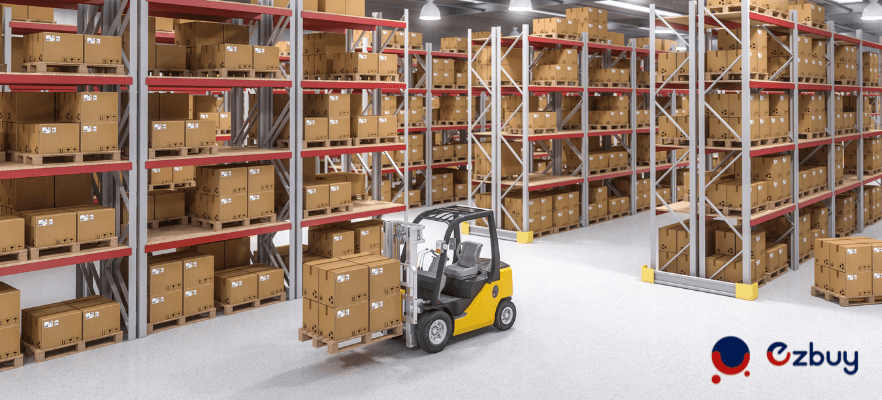Japan Logistics Market: Trends, Size, and Opportunities in 2025
By Macy -08/05/2025 UTC.
"Made in Japan" is a phrase attached to products and goods that has become, in many instances, a synonym for a high-quality product. Considering Logistics, Japan also stands out worldwide for its high-quality service. This is supported by the country’s strategic geographic location at the heart of the APAC region, as well as advanced cloud-based supply chain management systems.
In this report, we delve into key trends, market size, and growth opportunities in “Japan logistics market”, equipping sellers with valuable insights to develop effective strategies before entering the Japanese e-commerce market.
1. Japan Logistics Market Overview
Japan logistics industry is expanding with e-commerce growth, globalization, and sustainability initiatives. Known for efficiency and technological advancements, it plays a vital role in the economy, supported by a strong manufacturing sector and seamless supply chain network.
A well-integrated transportation system—including road, rail, air, and maritime services—enhances connectivity. Companies leverage automation, AI, and IoT to optimize operations and meet rising demand for last-mile delivery and modern warehousing.
Sustainability is a key focus, with green initiatives like electric vehicles, optimized routes, and eco-friendly packaging. As consumer expectations evolve, the Japan supply chain market continues to set global standards in efficiency and service quality.
2. Key Trends Shaping the Japan Logistics Market
Grasping the key trends in Japan’s logistics market is essential for businesses looking to establish a competitive edge. As the industry evolves, several factors are driving transformation, shaping how goods are stored, transported, and delivered. So don’t miss out on the findings below!
Rise of E-commerce Logistics in Japan
The rapid expansion of e-commerce has significantly influenced Japan's logistics landscape. With major platforms like Rakuten, Amazon Japan, and Yahoo! Shopping experiencing surging demand, logistics providers must adapt to increased order volumes and consumer expectations for fast, reliable delivery. The rise of same-day and next-day delivery services has led to a growing need for advanced warehousing, fulfillment centers, and last-mile delivery solutions.
That is why micro-fulfillment centers and regional distribution hubs are becoming trendy because they help to reduce delivery times. Micro-fulfillment centers (MFCs) are small, highly automated warehouses located close to urban areas or high-demand regions. They are designed to speed up order processing and last-mile delivery, especially for e-commerce and grocery businesses.

Additionally, the demand for temperature-controlled logistics is increasing, particularly for food, pharmaceuticals, and cosmetics, ensuring product integrity during transit.
Adoption of Logistics Technology
Japan has long been a pioneer in adopting cutting-edge technology, and the logistics sector is no exception. Automation, artificial intelligence (AI), and robotics are being integrated into warehousing and distribution operations to enhance efficiency and accuracy.
Autonomous mobile robots (AMRs) and automated guided vehicles (AGVs) are increasingly used in warehouses to streamline sorting, packing, and inventory management. AI-powered route optimization helps improve delivery speed and reduce transportation costs, while IoT-enabled tracking systems provide real-time visibility into shipments, ensuring greater transparency for businesses and customers alike.
Furthermore, digital twin technology is emerging as a powerful tool for logistics firms, allowing them to simulate and optimize supply chain processes before implementing changes in the real world. These innovations collectively drive greater operational efficiency and customer satisfaction.
Sustainability in Logistics
Japan's supply chain market prioritizes sustainability, driven by a 2050 carbon neutrality goal. Logistics firms are adopting green technologies like electric and hydrogen-powered vehicles, optimizing delivery routes, and using renewable energy in warehouses. Eco-friendly packaging and reusable materials further reduce waste, while "green logistics hubs" integrate solar power and smart energy systems to minimize environmental impact.
3. Japan Logistics Market Size and Growth
Understanding Japan logistics market size is crucial for businesses evaluating its potential before making investment decisions. This section provides current statistics, forecasts for 2025, and a comparative analysis with other key markets in the region.
Current Market Size
As of 2024, Japan logistics market size was valued at USD 278.6 billion in 2024. In terms of segment, transportation services were the largest revenue-generating service in 2024. Meanwhile, Warehousing and Distribution Services is the most lucrative service segment registering the fastest growth during the forecast period.
The market is projected to experience significant growth in the coming years. According to forecasts, the market is expected to reach USD 443.6 billion by 2030, growing at a compound annual growth rate (CAGR) of 8.1% from 2025 to 2030.
How Japan's logistics market stands out among other countries
When comparing Japan logistics market size to other major markets in the Asia-Pacific region:
- China: China stands as the largest logistics market in the region, with a market size of approximately USD 10,358.07 billion.
- South Korea: South Korea's logistics market is also significant, with a market size of approximately USD 1,270.92 billion.
It's important to note that while Japan supply chain market is smaller in absolute terms compared to China, it remains one of the most advanced and efficient globally. The country's focus on technological innovation, infrastructure development, and sustainability continues to strengthen its position in the regional and global logistics landscape.
>>> Read more: Ecommerce Logistics in Japan - Navigating Fulfillment and Cross-Border Shipping Solutions
4. Major Players in the Japan Logistics Market
4.1. Leading Japanese Logistics Companies

Japan's logistics sector is dominated by several key players, each offering specialized services to cater to domestic and international supply chain needs. Below are some of the most prominent logistics companies in Japan:
- Nippon Express: As one of Japan’s largest logistics providers, Nippon Express offers comprehensive freight transportation, warehousing, and supply chain solutions across air, sea, and rail. The company is known for its global reach and specialized logistics services for industries such as automotive, pharmaceuticals, and heavy machinery.
- Yamato Holdings: Famous for its Takkyubin (宅急便) door-to-door delivery service, Yamato is a leader in small-parcel logistics. The company provides extensive last-mile delivery solutions and operates a vast distribution network across Japan, making it a go-to choice for e-commerce businesses.
- Kintetsu World Express (KWE): Specializing in international freight forwarding, KWE is a key player in global logistics. The company offers tailored solutions in air and sea freight, customs brokerage, and warehousing, serving industries such as electronics, automotive, and healthcare.
- Sagawa Express: With a strong presence in domestic logistics, Sagawa Express provides efficient parcel delivery, 3PL (third-party logistics), and corporate distribution services. The company is recognized for its reliability in handling both B2B and B2C logistics.
- Yusen Logistics: A subsidiary of NYK Group, Yusen Logistics focuses on integrated logistics solutions, including contract logistics, freight forwarding, and supply chain management. Its expertise spans various industries, from retail to high-tech manufacturing
4.2. Role of Freight Forwarding in Japan
Freight forwarding is the strategic planning and coordination of the international movement of goods via air, sea, rail, and/or highway transportation. Freight forwarding plays a critical role in Japan’s trade-dependent economy, ensuring smooth movement of goods across borders. With Japan being one of the world’s largest exporters and importers, efficient freight forwarding is essential for businesses to navigate customs regulations, optimize shipping routes, and reduce logistics costs.
Key contributions of freight forwarders in Japan include:
- Customs clearance: Streamlining the process for both importers and exporters by handling documentation, duties, and compliance requirements.
- Multimodal transportation: Coordinating air, sea, and land freight solutions to ensure cost-effective and timely deliveries.
- Supply chain optimization: Providing warehousing, inventory management, and distribution services to enhance efficiency.
There are numerous freight forwarding in the market but Japan-gifted freight forwarding services are listed by: Ezbuy, EFEX, JAS Japan,... These parties provide end-to-end services from order processing, and fulfillment to shipment, ensuring seamless logistics operations. Their expertise in Japan's logistics industry allows businesses to navigate complex regulations, optimize shipping routes, and reduce operational costs.

By leveraging advanced technology and a deep understanding of the Japan supply chain market, these freight forwarders enhance efficiency and reliability in global trade. As the Japan logistics market size continues to grow, the role of freight forwarders in facilitating smooth and compliant transportation becomes increasingly vital.
5. Infrastructure of Japan Logistics Market
For a comprehensive look at Japan’s robust logistics infrastructure, you should explore this section. An efficient network of ports, airports, and rail systems, plays a key role in its export-driven economy and global supply chain integration.
Major Ports Driving Global Trade
It is due to Japan's strategic location in the Asia-Pacific region that makes its ports critical hubs for international trade. Below are some of the most significant ports:
- Port of Yokohama: A key gateway for containerized cargo, known for its advanced automation and deep-water berths accommodating large vessels.
- Port of Kobe: Plays a vital role in trade with East Asia and North America, specializing in handling bulk cargo and automobiles.
- Port of Tokyo: One of the busiest ports in Japan, serving as a central hub for both domestic and international shipments.
What sets these ports apart is their use of cutting-edge logistics technologies, such as automated container handling systems and real-time cargo tracking, to boost efficiency and shorten transit times.
Well-Connected Air Freight Hubs
Japan’s air freight network ensures fast and reliable transportation of goods, especially for high-value and time-sensitive shipments. Major international airports include:
- Narita International Airport (Tokyo): The leading hub for international cargo, handling a large portion of Japan’s air freight volume.
- Kansai International Airport (Osaka): Serves as a critical gateway for trade with Asia and Europe, supporting e-commerce and just-in-time logistics.
- Chubu Centrair International Airport (Nagoya): A key logistics hub for automotive and industrial exports.
These airports are integrated with advanced cargo facilities and logistics parks to facilitate efficient freight movement.
Extensive Railway and Road Networks
With the rise of same-day and next-day delivery expectations, Japan’s logistics efficiency is further supported by its high-speed rail and extensive road infrastructure:
- Shinkansen (Bullet Train) Freight Services: This is especially beneficial for time-sensitive and high-value goods such as pharmaceuticals, electronics, and perishable items that require rapid delivery to major urban centers.
- Comprehensive Highway System: Japan's expressway network is meticulously maintained, allowing for efficient long-haul trucking across the country. This system is crucial for transporting medium- to large-scale shipments, including retail goods, machinery, and automotive parts. It plays a key role in just-in-time (JIT) logistics, which is essential for Japan’s manufacturing sector, particularly in industries like automotive and consumer electronics.
- Urban Logistics Hubs: Strategically located warehouses and distribution centers near metropolitan areas optimize last-mile delivery, ensuring fast and reliable e-commerce fulfillment. These hubs are well-suited for fast-moving consumer goods (FMCG), fashion items, and grocery deliveries, where speed and accessibility are critical.
This well-integrated railway and road network ensures that different types of goods—ranging from perishable items to industrial components—are transported with maximum efficiency, supporting Japan’s position as a global logistics leader.
Geographic Advantage in Global Supply Chains
Japan's geographic position as an island nation in East Asia enhances its role in global supply chains because of the following reasons:
- Proximity to Major Markets: Close access to China, South Korea, and Southeast Asia makes Japan an ideal distribution hub.
- Disaster-Resilient Infrastructure: Investments in earthquake-proof structures and climate-resilient logistics facilities ensure supply chain stability.
- Free Trade Agreements (FTAs): Japan’s trade agreements, such as the Regional Comprehensive Economic Partnership (RCEP), facilitate smoother cross-border logistics.
With continuous advancements in infrastructure, automation, and connectivity, Japan remains a crucial player in global logistics, supporting both domestic distribution and international trade.
6. Challenges Facing the Japan Logistics Market
Perfection is unattainable—the key is to navigate challenges wisely! Besides advanced infrastructure and strategic advantages, Japan's logistics market faces several challenges that businesses must navigate.
Aging Workforce and Labor Shortages
Japan's declining birth rate and aging population pose a significant challenge for the logistics industry. With fewer young workers entering the sector, companies struggle to fill critical roles such as truck drivers, warehouse staff, and supply chain managers. Automation and robotics are being increasingly adopted to mitigate labor shortages, but the transition requires substantial investment and time.
High Operational Costs
Operating a logistics business in Japan is costly due to several factors:
- Geographical Constraints: Japan's mountainous terrain and densely populated urban areas make transportation and warehousing expensive.
- Technology Investment: High-tech logistics solutions, such as automated warehouses and AI-driven supply chain management, require significant capital expenditure.
- Regulatory Compliance: Strict safety and environmental regulations add to operational expenses, requiring businesses to invest in sustainable and compliant logistics practices.
Natural Disaster Risks
Undoubtedly, natural disasters are a pressing concern in Japan, causing significant disruptions across various aspects of life, including logistics operations. Earthquakes, tsunamis, and typhoons can disrupt supply chains and cause severe damage to infrastructure. To stay resilient, businesses must act now—implementing robust disaster preparedness strategies is no longer optional but essential!
Addressing these challenges is crucial for businesses looking to maintain efficiency and competitiveness in Japan’s logistics sector. By leveraging technology, optimizing costs, and enhancing disaster resilience, companies can navigate these obstacles while capitalizing on Japan market opportunities.
>>> Read more: Logistics Companies in Japan – Your Guide to Top Providers in 2025
7. Opportunities in the Japan Logistics Market
Despite its challenges, Japan’s logistics market presents significant opportunities for businesses looking to expand or optimize their supply chain operations.
E-commerce Boom and Cross-Border Trade
The rapid growth of e-commerce, fueled by platforms like Rakuten and Amazon Japan, has created a high demand for efficient logistics solutions. Cross-border trade is also expanding, with Japan serving as a strategic hub for global commerce. Businesses that provide seamless fulfillment and last-mile delivery services stand to gain a competitive edge.
Advancements in Smart Logistics and Automation
With labor shortages driving the need for efficiency, automation and AI-powered logistics solutions are transforming supply chain management. Warehouses are integrating robotics, IoT, and data analytics to streamline inventory tracking, reduce errors, and improve order fulfillment speed. Companies investing in smart logistics technologies can capitalize on these advancements to optimize operations.
Sustainability and Green Logistics
Japan’s commitment to carbon neutrality by 2050 has accelerated the adoption of eco-friendly logistics practices. The rise of electric delivery vehicles, energy-efficient warehouses, and sustainable packaging solutions presents new opportunities for businesses aligning with green logistics trends. Government incentives and consumer demand for environmentally responsible supply chains further encourage this shift.

Expansion of Cold Chain Logistics
The increasing demand for fresh food, pharmaceuticals, and temperature-sensitive goods has boosted the need for reliable cold chain logistics. Investments in refrigerated storage, advanced tracking systems, and specialized transportation services offer businesses a way to tap into this growing market segment.
Integration of Digital Platforms and API Connectivity
The adoption of digital logistics platforms, enhanced by API-driven integrations, is streamlining supply chain management. Businesses leveraging cloud-based logistics solutions can enhance visibility, improve efficiency, and connect seamlessly with suppliers and carriers.
8. Conclusion
In conclusion, Japan logistics market is a dynamic and evolving sector driven by technological advancements, e-commerce growth, and sustainability initiatives. With a well-integrated transportation network, cutting-edge automation, and a strategic geographic position, Japan continues to set global standards in efficiency and reliability. However, businesses must also navigate challenges such as labor shortages, high operational costs, and natural disaster risks to maintain a competitive edge.
For companies looking to optimize their logistics operations in Japan, partnering with a reliable logistics solutions provider is key. At Ezbuy, we specialize in streamlining supply chain management with innovative, cost-effective, and sustainable solutions tailored to your business needs. Whether you’re expanding into Japan’s market or optimizing your existing operations, our expert team is ready to help you overcome logistics challenges and unlock new growth opportunities.
Learn more about our logistics solutions by visiting our Homepage, contacting us through https://ezbuy.jp/en. Let’s navigate Japan’s logistics landscape together!
Email: [email protected]